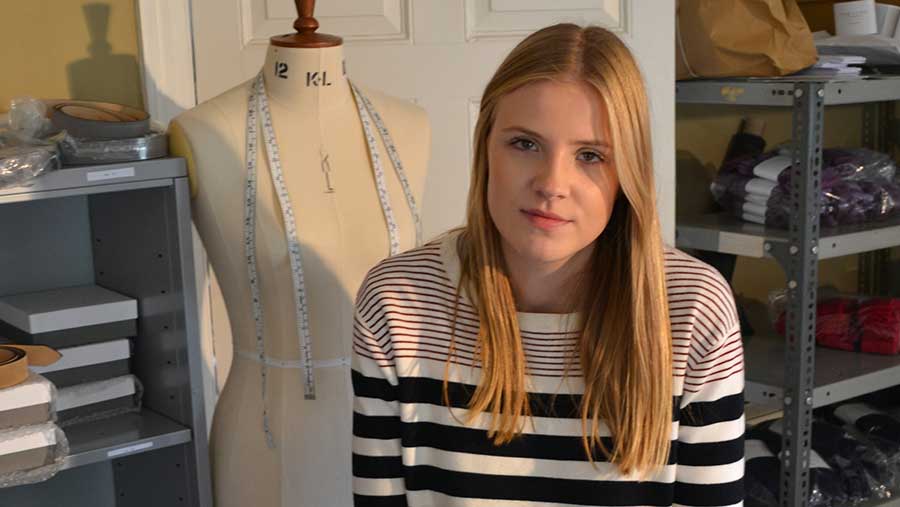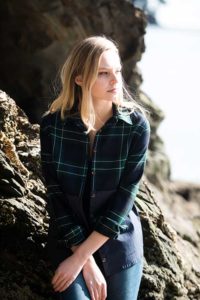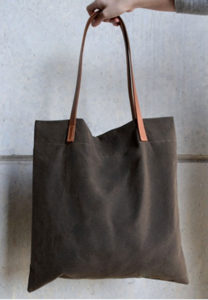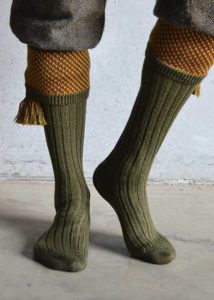Farming inspires Lincolnshire fashion business

Jayne Ireland, the designer behind the Tom Lane brand of country clothing and accessories, gets her dad, arable farmer James, to try out her range of walking and shooting socks while out and about on Grange Farm, North Rauceby, near Sleaford.
“I am interested in practical clothes and how they perform,” Jayne says. “Often what you see on the catwalk is beautiful, but not always practical.
“I am not part of the ‘throwaway’ fashion generation. It is important to me that our products stand the test of time and there’s no better test than out on the farm,” she adds.
Jayne grew up on the farm and it has always influenced her work. “I was arty at school and decided fashion was what I was passionate about, but it could equally have been farming,” she admits.
See also: What’s hot in ag student fashion
Every summer throughout her three-year Fashion Design BA course at Falmouth University she worked for grain co-operative Openfield as a grain sampler in her home county, returning there after graduation.
“I was finishing a two-month internship with a fashion designer in London and they couldn’t believe it when I said I had to go home for harvest,” Jayne recalls. “But I enjoy the contrast between my farm life and the fashion industry.”
Launch of Tom Lane
Despite a first class degree and several fashion internships, Jayne found it tricky to find a job that she wanted. In her third year at Falmouth she’d written a business plan and, after harvest was over, decided to put theory into practice.
“The turning point was a four-day course on starting a fashion label at the London College of Fashion,” she recalls.
“I started work on the business in December 2014 pattern cutting, sourcing fabrics and designing the logo ahead of launching Tom Lane in July 2015.”
Jayne’s 2014 finals show had been inspired by the country in general and shooting in particular, featuring Harris tweed trench coats and shooting jackets.
And when it came to naming her new company, home provided inspiration once again. “Tom Lane is the name of the road that runs through our village,” she explains. “It suits the brand.
“The name does cause a bit of confusion,” Jayne admits. “Any male on our stand immediately gets called ‘Tom’ and I frequently get emails addressed to ‘Dear Mr Lane,’ but when I explain where the name comes from everyone loves it.”
Made in Britain
Equally, the “Made in Britain” label is a definite selling point. “‘Where shall we make our products?’ was never a question,” Jayne says. “They were always going to be made in Britain.”
Everything in the collection, ranging from shirts to shooting socks, belts and scarves, is made in the UK.
“It’s not easy because we don’t have a huge amount of textile industry left in this country – but we do have some, so it’s important to support them.
“I was lucky that I stumbled upon a small workshop in Wales for my first collection of shirts, including the Wanderer shirt made of waterproof waxed cotton and breathable wool, and then I found a sock manufacturer just 40 minutes away from the farm.
“I could manufacture abroad and make more money, but I don’t want to. I like to know where things come from and so do our customers. Being able to tell them the story behind a product is part of the appeal.”
The farm gave Jayne space to set up a studio where she makes her own waxed cotton tote bags (£59). She sources the waxed cotton from the Halley Stevensons mill in Dundee and the water-repellent cotton for the lining from Lancashire.
The leather handles are made by Colin at McRostie in Glasgow, a heavyweight leather specialist, to a length and width specified by Jayne – who then hand-sews them onto the bags herself.
“It’s time consuming but it is the strongest and most aesthetically pleasing way to finish the bag,” she says.
Tom Lane products are not cheap, but the dedication to detail and craftsmanship pays off in the quality and longevity of the product. For instance, every shirt is treated individually to ensure exacting standards.
“We like things that get better with age, which might explain our obsession with waxed cotton!”
Sourcing quality
Part of the commitment to sourcing quality products is visiting the factories in which they are made. Jayne chronicles her visits to mills and sock manufacturers in her online journal.
Her dad often accompanies her on these visits. “He is coming to appreciate just how much goes into creating something as seemingly simple as a bag or a sock,” she says.
And it seems James’ enthusiasm has rubbed off on other farming friends. “Dad volunteered to do the Lincolnshire Show for me this summer when the date clashed with another big show in London,” Jayne says.
“As the date got nearer he was obviously apprehensive, but he did so well and introduced Tom Lane to lots of farmer friends.”
But now it is up to Jayne to develop the brand. Her first year has seen her setting up stall at shows up and down the country from Chatsworth Country Show to The Game Fair, Badminton and Burghley Horse Trials and London events such as The Country Living Fair.
“The shows are great for meeting customers and letting them see the products in person. I can’t tell you how many people I have met called Tom Lane,” she laughs.
Customer-led business
“It is so important to get feedback. But I have also been able to extend the range, such as introducing cashmere hats and gloves, by responding to enquiries. And the fairs feed into the online business. People take a leaflet and that way we get return custom.
“The business has to be customer-led. We always go the extra mile to help customers, talking on the phone if they don’t have internet access or customising socks in a particular colour or design.”
It’s hard to imagine anyone could come up with a colour or design not on the website, which has 40 varieties of shooting sock ranging in colour, style and price range. Pick a pair of Suffolk shooting socks in bright blue merino wool with a woven top hand-linked onto the body (£45), or opt for odour-resistant boot socks made from Tibetan Yak wool (£22) or a pair of stripy Alpaca socks (£12).
The socks are racing off the shelves at the start of the shooting season. “My dad’s house is just full of socks at the moment,” Jayne laughs. “This first year I have just about kept pace with demand, but the challenge now is getting stocking levels right for Christmas.”
Plans to expand
Creating a good website is vital for the expansion of the business. “Next year I’ll be focusing less on the shows, which are expensive and time-consuming, and more on the internet business,” Jayne says.
She has just upgraded her website to take overseas orders. “I’m not particularly computer savvy and got a firm in Lincoln to do the web design,” she says. “The important thing is that I can upload and update products on the site myself.”
Jayne is seeking to develop contemporary as well as country clothing – classic work shirts and knitwear – while also dipping a toe into the wholesale market, supplying independent shops with products.
“My message to other people thinking of setting up their own fashion business is always ‘Go for it on the business side but make sure you test everything,’” Jayne says.
“It’s so important to be practical, otherwise you can end up making costly mistakes.”
So while Jayne is photographing her new range of Yak socks in the farm grain store, her Dad is out road testing them on the tractor.
